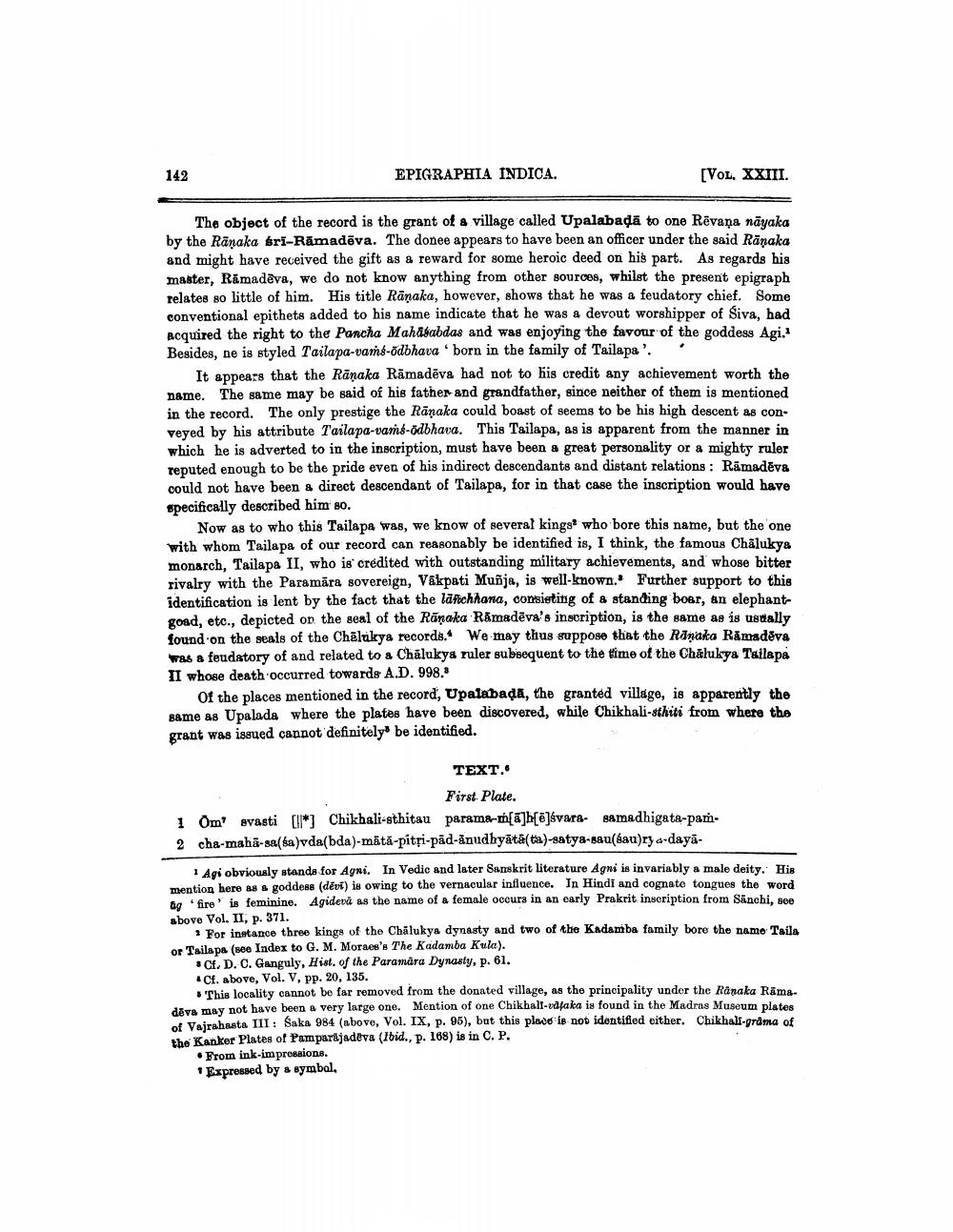________________
142
EPIGRAPHIA INDICA.
[VOL. XXIII.
The object of the record is the grant of a village called Upalabadā to one Rēvaņa nāyaka by the Ränaka sri-Rāmadēva. The donee appears to have been an officer under the said Ränaka and might have received the gift as a reward for some heroic deed on his part. As regards his master, Ramadeva, we do not know anything from other sources, whilst the present epigraph relates so little of him. His title Ränaka, however, shows that he was a feudatory chief. Some conventional epithets added to his name indicate that he was a devout worshipper of Siva, had acquired the right to the Pancha Mahasabdas and was enjoying the favour of the goddess Agi. Besides, ne is styled Tailapa-vams-odbhava born in the family of Tailapa'. .
It appears that the Rānaka Ramadēva had not to his credit any achievement worth the name. The same may be said of his father and grandfather, since neither of them is mentioned in the record. The only prestige the Rāņaka could boast of seems to be his high descent as conveyed by his attribute Tailapa-vams-odbhava. This Tailapa, as is apparent from the manner in which he is adverted to in the inscription, must have been a great personality or a mighty ruler reputed enough to be the pride even of his indirect descendants and distant relations: Ramadēva could not have been & direct descendant of Tailapa, for in that case the inscription would have specifically described him so.
Now as to who this Tailapa was, we know of several kingse who bore this name, but the one with whom Tailapа of our record can reasonably be identified is, I think, the famous Chalukya monarch, Tailapa II, who is credited with outstanding military achievements, and whose bitter rivalry with the Paramāra sovereign, Vakpati Muñja, is well-known. Further support to this identification is lent by the fact that the lāfichhana, consisting of a standing boer, an elephantgoad, etc., depicted on the seal of the Rūnaka Rámadēva's inscription, is the same as is usually found on the seals of the Chēlukya records. We may thus suppose that the Ranaka Ramadēva was a feudatory of and related to a Chalukys ruler subsequent to the time of the Chalukya Tailapa II whose death occurred towards A.D. 998.
of the places mentioned in the record, Upalabada, the granted village, is apparently the same as Upalada where the plates have been discovered, while Chikhali-sthiti from where the grant was issued cannot definitely be identified.
TEXT.
First. Plate. 1 Om' avasti [ll*] Chikhali-sthitau parama-m[a]b[@]svara- samadhigata-pam2 cha-maha-sa(sa)vda(bda)-mātā-pitsi-păd-ánudhyātā(ta)-satya-sau(sau)rya-daya
1 Agi obviously stands for Agni. In Vedic and later Sanskrit literature Agns is invariably a male deity. His mention here as goddess (devt) is owing to the vernacular influence. In Hindi and cognato tongues the word og fire is feminine. Agidevä as the name of a female occurs in an early Prakrit inscription from Sanchi, see above Vol. II, p. 371.
* For instance three kings of the Chalukya dynasty and two of the Kadamba family bore the name Taila or Tailapa (ne Index to G. M. Moraes's The Kadamba Kula).
*Cf. D. C. Ganguly, Hist. of the Paramara Dynasty, p. 61. Cf. above, Vol. V, pp. 20, 135.
This locality cannot be far removed from the donated village, as the principality under the Ranaka Rāma. deva may not have been a very large one. Mention of one Chikhall-udjaka is found in the Madras Museum plates of Vajrahasta III : Saka 984 (above, Vol. IX, p. 95), but this place is not identified either. Chikhali-grama of the Kanker Plates of Pamparijadeva (Ibid., p. 168) is in C. P.
• From ink-impressions. * Expressed by a symbol.




